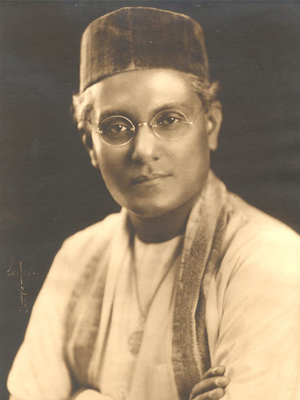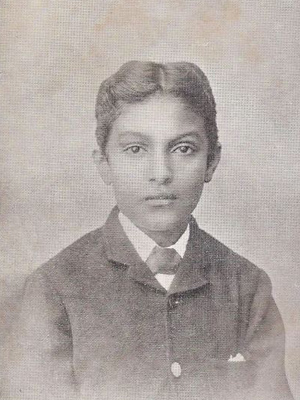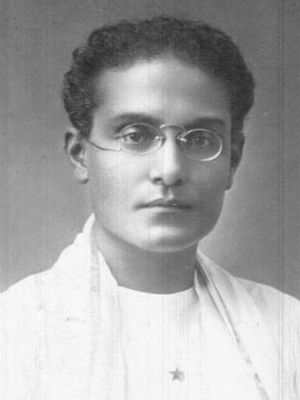
Masonic Biographies
C. Jinarajadasa
Born: Thursday, 16 December 1875
Died: Thursday, 18 June 1953
C. Jinarajadasa was a Co-Mason, Theosophist, author, speaker and mystic who was responsible not only for the spread of Theosophical ideas around the globe but for the flourishing of Co-Masonry in the Americas.
 When most people think of Curuppumullage Jinarajadasa today, they do not think of him as anything but “theosophical.” In fact, as one looks around at the copious Internet references to him, nearly all of it has a focus on his abundant and wonderful contributions to the Theosophical Society and theosophy in general. As the President of the Theosophical Society for eight years, until the end of his life in 1953, he traveled the world promoting theosophical principles and the Society itself. However, he was a tour de force for Universal Freemasonry as well, across not only Europe and India, but also very importantly, the Americas.
When most people think of Curuppumullage Jinarajadasa today, they do not think of him as anything but “theosophical.” In fact, as one looks around at the copious Internet references to him, nearly all of it has a focus on his abundant and wonderful contributions to the Theosophical Society and theosophy in general. As the President of the Theosophical Society for eight years, until the end of his life in 1953, he traveled the world promoting theosophical principles and the Society itself. However, he was a tour de force for Universal Freemasonry as well, across not only Europe and India, but also very importantly, the Americas.
Jinarajadasa was born in Ceylon, modern day Sri Lanka, in December 1875. Not much is spoken about in his early life. We know that after Charles Leadbeater founded Ananda College in India, Jinarajadasa was one of his first students. When Leadbeater was asked to come back to England in 1889, he brought Jinarajadasa with him. From there, Jinarajadasa completed his studies at Cambridge, where he graduated with a degree in Oriental Languages. Later, he would also study in Italy (learning Italian), at the University of Pavia.
Shortly thereafter, Jinarajadasa traveled back to his native Ceylon, where he became the vice principal of Ananda College. From this point on, with a deep understanding of theosophy and esoteric studies, Jinarajadasa began to travel the world to speak about theosophy, Freemasonry, and deep spiritual topics. It was also at this point that Jinarajadasa began writing and would continue to be a prolific writer throughout his life. He contributed over articles to the Theosophical Society’s publications, and in 1913 was awarded the T. Subba Row Medal as an acknowledgement of his contributions to this point. By the end of his life, he would write and contribute to a total of over 1600 articles and over 50 books, pamphlets, and speeches on Theosophy and Freemasonry.
It was about this time, 1906, that he began to travel around the globe and landed in England for a time, where he met and married a suffragette named Dorothy May Graham. They married in 1916 in Kensington (London, England) and were together until his death in 1953. Dorothy traveled with him all over the world and with Annie Bessant, she established the Women’s Indian Association in Adyar, India. Jinarajadasa was an ardent supporter of the rights of women, and although he didn’t speak much of interactions with his wife, she certainly had an influence on some of his writings and thoughts on the matter.
According to Le Droit Humain records, Jinarajadasa was initiated into International Co-Masonry in 1908 in Cleveland, Ohio, in Lodge Human Law. There do not appear to be any other records for his Passing or Raising in the order; however, it was clear that by 1929, Bro. Jinarajadasa had ascended to the degree of Grand Inspector General of the Eastern Federation of La Droit Humain and began to establish lodges in South America.
According to Iozia, “In 1919, a Lodge was founded in San José in Costa Rica by Brother José Basileo Acuna Zeledon, initiated in France during his engagement as a nurse in the French army during the First World War. He translated the York (English) Rite into Spanish, giving it a theosophical connotation.” It was in 1929 that Bro Jinarajadasa traveled to the country of Costa Rica, and with authorization from the British Federation, initiated several Master Masons into the degree of the Rose Croix of Heredom, and thus created a Rose Croix Chapter in the Orient of Costa Rica called Servicio Chapter, No. 82, on June 9, 1929.
In that same year, Bro. Jinarajadasa conferred the degree of Knight Kadosh on several members in Costa Rica, and in 1934 founded an Aeropagus in that location. Again, in 1929, Bro. Jinarajadasa traveled to Lima, Peru where he formed a new Blue Lodge with the assistance of a Bro. Cardeñas. This was Lodge No. 637 in Le Droit Humain, International Mixed Masonry.
Bro. Jinarajadasa continued to travel the countries of South America, undoubtably assisted by his fluency in both Spanish and Portuguese. In Chile, Bro. Jinarajadasa created four Blue Lodges between 1930 and 1934, where he also gave numerous workshops. These four Lodges allowed the creation of the Chilean Federation of International Freemasonry in 1934.
From 1930, International Mixed Masonry (today Universal Freemasonry) experienced a decade of quite remarkable progress. There were numerous affiliations coming from the Grand Lodge of Chile, as are requests from lay people interested in this new Freemasonry. Thus, in 1930, Horus and Pythagoras lodges were founded in Santiago, in 1932, Isis Lodge, in 1933 Orion, Minerva, Osiris Lodges and in 1934, Hiram Lodge. By the end of the decade, there were a total of thirteen mixed Masonry Lodges in Chile.
About this remarkable achievement, it is noted:
“During this visit members of the Grand Lodge of Chile, and a group of members of the Theosophical Society, asked him (Jinarajadasa) for authorization to found a mixed Lodge and to approve the applications for admission of thirteen candidates. This request is sent immediately to the General Secretariat of the Supreme Council in Paris. On February 23, 1929, Jinarajadasa received a cable authorizing this creation. He decides to call this new Lodge Equality; two days later, performs the consecration of the Lodge which is No. 632 on the rolls.”
In a report for Igualdad (English – Equality) No. 632 (est. 1949), Sister Angelica de Lopez, from the Orient of Santiago de Chile, had this to say about Bro. Jinarajadasa:
“The development of Mixed Masonry in South and Central America was largely the result of Bro. Raja’s activities. In these countries, he organized a set of lodges of different degrees and gave public conferences dealing with Freemasonry, which received a warm welcome.
In the summer of 1929, Brother Jinarajadasa came to Chile. He was received by Theosophists of Valparaiso and Santiago as well as by eminent members of the Grand Lodge of Chile, among whom were brothers present today, full of energy and enthusiasm […]. Brother Jinarajadasa with luminous speed implemented the project of founding a lodge with three symbolic degrees, thus laying the foundations of what is called today the Chilean Federation of International Mixed Masonry, Human Rights.”
By 1938, Bro. Jinarajadasa returned to Costa Rica, and found the members there had mobilized their Masonic resources and had grown significantly. He then traveled to Panama, where he requested authorization to establish a Triangle in Coronado, Panama. Bro. Jinarajadasa also founded a Lodge in Guatemala (now Honduras) in Tegucigalpa in 1939.
 After a brief return to the United States for personal matters, he continued his work in South America and the Caribbean. Some members in South America received, at Bro. Jinarajadasa’s urging, the degree of Sublime Prince of the Royal Secret, and subsequently a Consistory (The Consistory of South America and the Caribbean) was instituted on February 15, 1944.
After a brief return to the United States for personal matters, he continued his work in South America and the Caribbean. Some members in South America received, at Bro. Jinarajadasa’s urging, the degree of Sublime Prince of the Royal Secret, and subsequently a Consistory (The Consistory of South America and the Caribbean) was instituted on February 15, 1944.
In 1940, in recognition of his exceptional service rendered to mixed Freemasonry and to the well-being of Humanity, the Supreme International Joint Council conferred on Bro. Jinarajadasa the 33rd degree, the highest degree of the Ancient and Accepted Scottish Rite.
While Bro. Jinarajadasa was traveling the globe creating outposts of Freemasonry, he continued to write prolifically. He was especially focused on the rights of women. While traveling in South America and forming Lodges, he was struck by the open hostility of women receiving an education and the idea that women could be Freemasonry. He believed that the difficulty in beginning Mixed Masonry in South America, particularly countries like Venezuela, would be rectified in time.
In the Theosophist, in 1944. Edith D. Netland wrote,
“Mr. Jinarajadasa used some very significant words at the Theosophical Congress in London last August. “There, is,” he said, “a power in woman to be released, and until woman takes charge of that, she will not release certain powers in man.” Finally, let us recall the message of the Master K. H. in which He said: “On the elevation of Woman the world’s redemption and salvation hinge.”
Bro. Jinarajadasa continued to write about a dizzying array of subjects, from the Mahatma Letters of Blavatsky and Art as Will and Idea to a translation of the Bhavagad Gita. There are few articles that were written by him directly on Freemasonry, but of books and pamphlets of note are Women in Freemasonry (1944), The Religion and Philosophy of Freemasonry (1938) and The Ideals of Freemasonry (Excerpt from Gods in Chains, 1929).
In March of 1943, The American Theosophist dedicated its Vol. 31, No. 3 issue to the anniversary of Bro. Jinarajadasa’s contributions to the organization. The issue has a complete autobiographical sketch, along with various writings of his, and contributions by others who knew him, including two prominent Universal Freemasons, Bro. Edith Armor and Bro. Sidney Cook. The Very Ills. Bro. Edith Armor, M.P. Grand Commander of the American Federation, stated,
“His deep understanding of the occult values of Freemasonry, which from time immemorial have ever been concealed in the symbology and ritualistic pattern of the Craft, has been a source of inspiration to countless numbers of people throughout the world and has opened doors for them which otherwise would have remained closed.”
Bro. Helen Wycherley, in the American Theosophist also stated,
“Probably the greatest good one soul can do another is to call forth from its inmost recesses that mysterious flame of aspiration and will to achieve which brings the Pilgrim God ultimately to fulfillment of its destiny. In his own unique way Mr. Jinarajadasa invokes that subtle magic of release in others. It is as if he were to each a kind of personal prophet of the Is-to-be, looking beyond the personality of the moment to the far-off fulfillment of the Ego’s greatness, lifting for a moment the veil of the "Is” and leaving the Soul with a never-to-be-forgotten vision of the "Is-to-be.”
An aspect of Bro. Jinarajadasa’s writing is the essence of Hope. He speaks about this virtue often in his writings, and even today, these writings ring true. In this same issue of The American Theosophist, he speaks about the Future of Brotherhood, with a theosophical and Masonic point of view. This writing, which takes place at the height of World War 2, asks us all to have hope. “Nevertheless, an element of hope enters also into our thinking—at least for those of us who try to understand what is happening outside the boundaries of our country. There was never an era so full of idealists as today.” He speaks of hope when he looks to the future of women’s emancipation, and his eccentric nature brought the light of hope to resolving conflicts within groups.
Within the Theosophical Society and within Universal Freemasonry, Bro. Jinarajadasa was a unique individual, driven by the will to support other human beings and create a better world for us all. He spread the light of Universal Freemasonry throughout Central and South America and the Caribbean. He did this with that burning desire that at our core, we all have: hope for a better world.
I see before me a great era when wars will cease, when the economic life of the world will be so adjusted by a Council of all nations, that competition will cease, and yet the best goods will be produced, and there will be employment for all. There is no reason why any single person in the world should starve, or be badly clothed, or be without a roof. The world taken as a whole is rich: it has all the knowledge it requires; all our miseries today are due to bad management. But the good management which we need will not come by any miracle. We must create it. – C. Jinarajadasa, 1943
